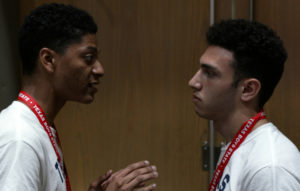As some of us still ponder the results of the presidential election of 2016, and view the approach of the 2020 election with trepidation, there is no more timely film than Amanda McBaine and Jesse Moss’ trenchant cinéma verité documentary, BOYS STATE. It paints a cautionary tale of the systemic failings of our society, and what we as a country have taught the next generation of leaders and voters. At once hopeful and fatalistic, it holds up a mirror to our culture to show us what is best and what is worst about politics as usual. And why politics as usual is inherently toxic, as noted in a quote from George Washington from 1796 at the beginning of the film, a quote in which he predicts the downfall of democracy if political parties become entrenched.

Robert Macdougal, Steven Garza
The action takes place at Texas Boys State in 2018, sponsored by the politically conservative American Legion. Over the course of one week, it takes 1200 17- and 18-year-old boys, randomly divides them into two different parties with no fixed ideology, and then lets them go about creating party platforms, proposing state legislation, and running for various state-wide offices. The goal is to teach them about government, but in an illuminating irony, the most hotly contested race is the one with no actual political power. That would be for governor. The two young men followed by the film who decide to run for one party’s nomination, Steven Garza, son of immigrants and the soul of quiet sincerity, and Robert Macdougal, the textbook definition of camera-ready glib charisma, provide a perfect distillation of the moral divide of running for office. The contrast between Steven’s earnest desire to earn support and create consensus and Robert’s embrace of bro-speak and expedient rhetoric are all too familiar. What is meant to be a learning experience for them provides a stark lesson for the audience as pro-choice Robert candidly, and unselfconsciously, avers that he now understands why politicians lie to get elected, as he does by taking a publicly anti-abortion stance. Watching Steven deliver his reasoned, heart-felt speech following one in which Robert plays to the receptive crowd’s toxic masculinity (declaring them disciplined but dangerous) is soul crushing. Watching Steven get a standing ovation afterwards is overwhelmingly healing.

René Otero, Ben Feinstein
What is most eye-opening, though, are the two subjects who are drawn to the power behind the election process, rather than the ceremonial office. There’s Rene Otero, the Chicago transplant of color with grave reservations about taking part at all, and Ben Feinstein, the double-amputee, political junkie, and Reagan fan-boy, who soon realize that the real power is as party chairman. Both have natural poise and self-assuredness beyond their years, but with diametrically opposing views about how to win an election, which comes down to René’s goal of high-road reconciliation, not antagonism, to achieve concensus, while Ben’s has him gleefully talking about a shock-and-awe campaign that is concerned about nothing except winning. In his use of media, he is the heir apparent to Lee Atwater and Karl Rove.
The issues, once the delegates get past discussing secession and an infrastructure to defend the Earth from invading extraterrestrials, take on a depressingly familiar ring. Abortion, immigration, and gun control. The preliminary rounds of debate include all three, including one candidate advocating castration for rapists rather than abortion for his victim. By the end, the hot-button issue is gun control. The reactionary faction on one side spewing conservative catch-phrases about the liberal agenda plotting to disarm the public, and Steven on the other, starting his speech on the subject by saying that he doesn’t think civilians should own high-grade military weapons.
McBaine and Moss have created a compelling piece of storytelling, acutely edited to capture not just the words, but also the essence of both the participants and the process. It finds in this purely ceremonial exercise a stark portrait of a deeply divided country at a crossroads, and in its protagonists’ struggles, a charged journey full of suspense, disappointment, and joy. Rarely have I been as invested in an outcome as I was in this mock governor’s race, and rarely have I had as emotional a reaction to that outcome.
BOYS STATE starts with a counselor asking some of the participants about 1984 and then explaining that the real threat isn’t the withholding of information as in Orwell’s dystopian vision of the future, but rather that of Aldous Huxley’s BRAVE NEW WORLD, in which the passivity of being catered to by technology breeds apathy and the illusion of freedom. There is no better preparation for what is to follow, and no more dire warning.
Your Thoughts?